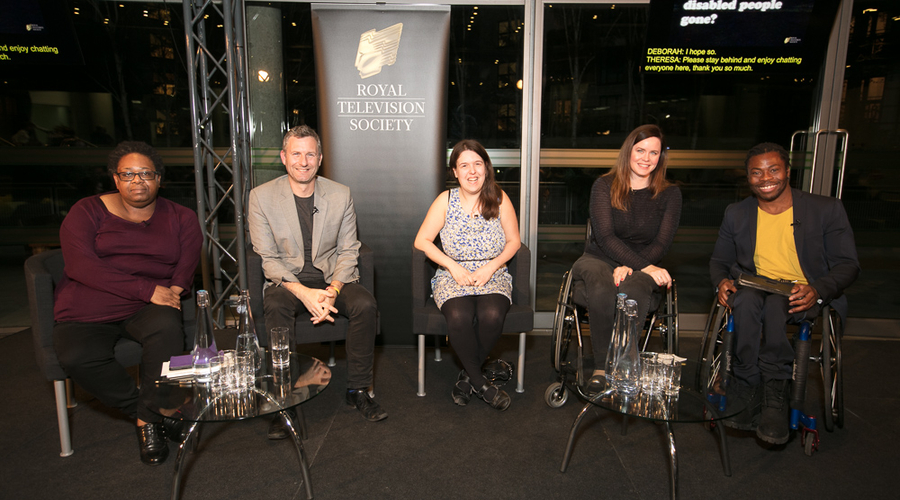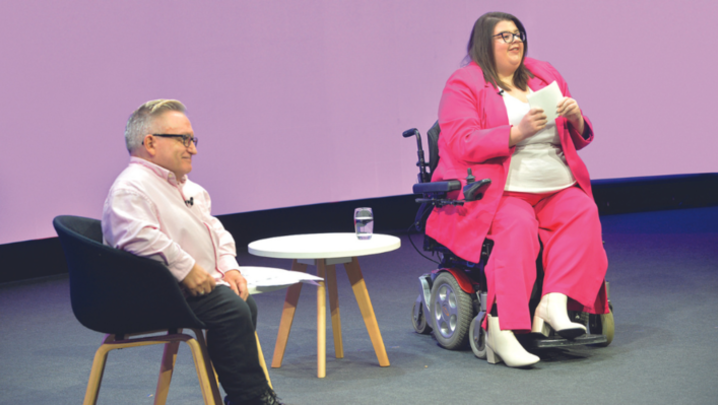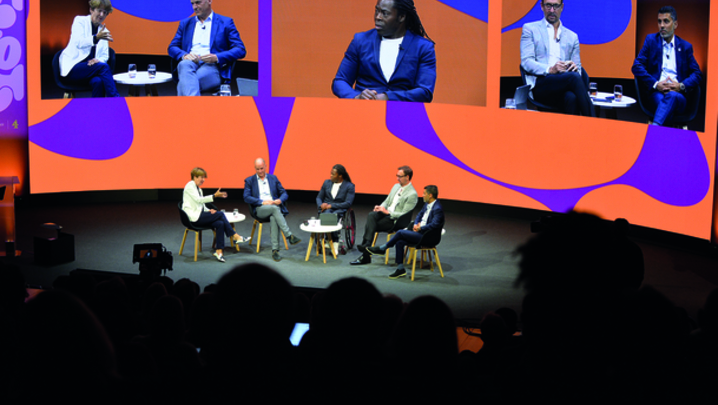An RTS panel explored why a fifth of the population still get a rough deal from TV. Steve Clarke took notes
Channel 4’s coverage of the 2012 London Paralympics was a big moment in British TV. For the first time, audiences saw disabled athletes as glamorous role models participating in a high-profile showcase. At a stroke, Channel 4 put the Paralympics on the map, after more than half a century of obscurity.
But, in the past four and a half years, have our broadcasters begun to fulfil the promise of the Paralympics in the representation of disabled people on TV – or are those with disabilities still being marginalised and stereotyped?
The title of this RTS event, “Where have all the disabled people gone?” suggested that we all know the answer and it is not one that disability campaigners are happy with.
This is despite Channel 4 investing a lot of resources in last year’s Rio Paralympics and screening several high-profile programmes that put disabled people to the fore. The network’s satirical panel show The Last Leg, spun off from the 2012 Paralympics, and dating show The Undateables, also launched in 2012, both come to mind.
"Don’t worry, I’ve got a dodgy voice but I’m all right at my job"
As the RTS audience heard, progress is being made, but a great deal more needs to be done. There are still few opportunities for non-able-bodied people seeking employment in TV.
And producers and commissioners are still struggling to think beyond the familiar stereotypes when disabled people are cast in shows.
In July 2014, the BBC announced a target to quadruple the number of disabled people on screen by the end of this year. The aim is to hire more disabled performers and presenters, as well as back-room staff.
The recent appointment of Parliamentarian Tanni Grey-Thompson to the new BBC Board is clearly a step in the right direction. Her elevation won’t have gone unnoticed by Ade Adepitan, the wheelchair basketball star who steered this discussion with wry good humour and a quiet passion.
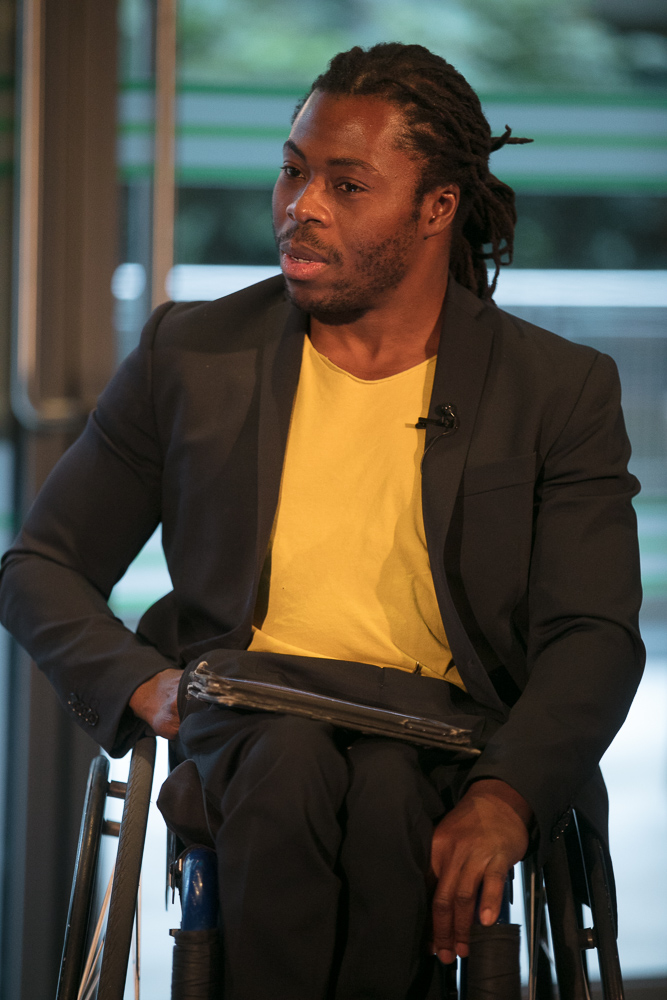
He was a medal winner at the 2004 Paralympics and has hosted shows for CBBC and appeared in EastEnders. Channel 4 picked him as one of its main presenters of the 2012 London and 2016 Rio Paralympics.
Laughter was much in evidence throughout the evening as the audience heard from a panel of people who, against the odds, are working successfully in TV.
There was anger and frustration, too, that, in an allegedly liberal sector such as TV, the disabled are too often feared and regarded as being akin to outcasts.
Adepitan said that around 20% of the UK population is estimated to be disabled or to suffer from a long-term health condition.
Disabled people find it hard to get a job per se, let alone work in TV. Two million of the disabled in Britain are unemployed.
“Potentially, that’s a lot of untapped talent,” said Adepitan, who also noted that UK soaps Coronation Street, EastEnders, Emmerdale and Hollyoaks had all recently featured disabled actors.
One of the themes to emerge from the evening was not only the lack of disabled people working in TV, especially in drama and comedy, but rampant stereotyping of those who do pass their auditions.
The importance of having televisual role models was stressed. Adepitan and the panellists agreed that seeing “someone like me” on TV could have “a profound effect” on a person’s self-esteem.
Rosie Jones, a researcher and comedian who has cerebral palsy, made the point with humour. She recalled that the first disabled character she saw on TV was a schoolgirl in BBC TV’s pioneering drama Grange Hill, launched in 1978. Rachel, played by Francesca Martinez, also had cerebral palsy.
While Jones was thrilled to see someone similar to her appearing in a TV show, she hated the fact that one of the storylines involved Rachel being bullied. “I had a great time at school and I bullied other people,” she said, to ripples of laughter from the audience.
Jones added: “I have never felt disabled. So it was interesting to see someone on TV [but] it made me quite angry. Why was she the only person I had to be compared to? It just made me feel like I wanted more people [like me] out there. Why wasn’t there an ultra-cool, ultra-funny person exactly like me?”
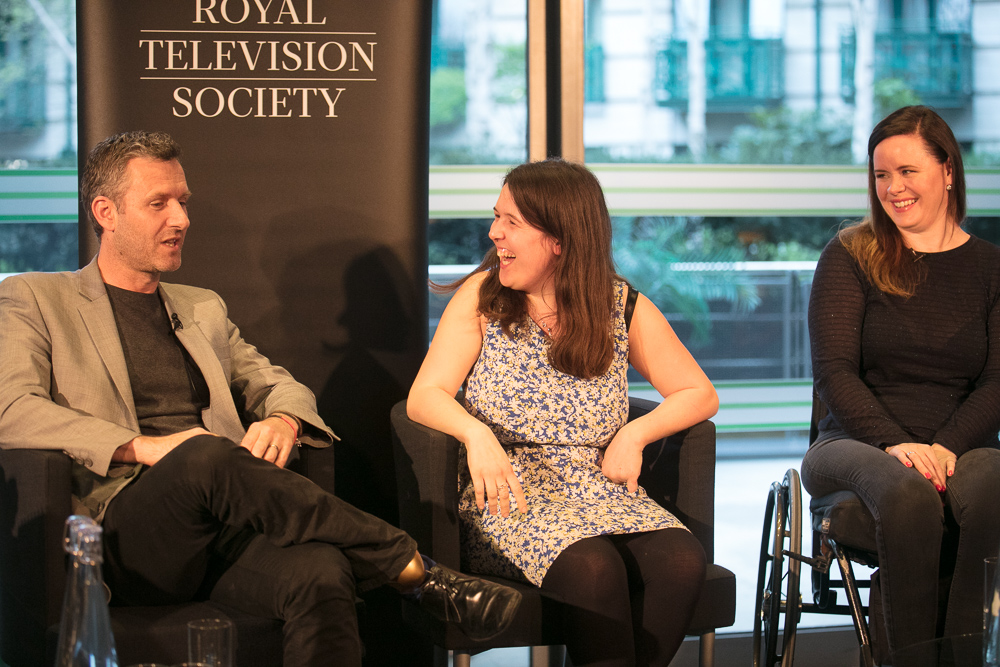
“Why are disabled people on TV always portrayed as being nice all the time?” asked Adam Hills, presenter of The Last Leg.
“Why aren’t there any [disabled] bastards on TV?” interjected Jones.
As the laughter from the audience subsided, Hills said that one of his early role models was athlete Oscar Pistorius. It should be stressed that, when he first saw Pistorius, the runner was not a convicted murderer.
Another early role model was Paralympian Jonnie Peacock. Like Hills, he had a single-leg, below-the-knee amputation. Until then, the only people Hills had seen with the condition were “old blokes”. “I was proud to see a positive representation of it… to see someone sprinting as fast as Jonnie,” recalled Hills.
By contrast, fellow panellist Deborah Williams, CEO of the Creative Diversity Network, said that she had no TV role models to inspire her. “I’ve never seen a black, disabled woman, slightly overweight, with no left hand, on television,” she told the RTS. “It makes me feel sick to the pit of my stomach.” In the mid-1980s, the only people she could begin to identify with on TV were French and Saunders. They looked completely different to anyone else on the box at that time.
“Because I don’t see myself on TV, I am not comfortable with myself, I am not happy with myself. Had I been able to see people like me on TV, it would have boosted my confidence,” said Williams, who performs as a comedian.
She stressed that one purpose of TV was to “remind us that we exist in many shapes”. “A lot of people perceive disability as a sickness and an illness they can catch.… They don’t think of disabled people as fully rounded individuals who have everything to offer.”
Financial considerations are often cited for failing to employ disabled people in TV. “With 30 years of doing this, people still say, ‘It will cost me money.’ I’m like, ‘Please, you spend more on your bar tab in a week than it costs to build a ramp or provide an interpreter,’” said Williams.
Shannon Murray, actress, writer and broadcaster, emphasised that disabled people need to be regarded as part of everyday society by their able-bodied peers. “We can like clothes and fashion and take pride in our appearance,” she said. “I wanted to snog boys [as a teenager] and go to clubs. [But] If you were in a wheelchair or were physically disabled [people thought] you shouldn’t be bothering with that: ‘No one’s going to be looking at you. You should be at home, knitting and wearing comfy shoes.’”
Paralysed from the waist down since the age of 14 following an accident, Murray has forged a career as a model, an actor and a lawyer. This has been in spite of obstacles such as no disabled access to some casting-audition venues.
“We are all mature enough and have our shit together enough to do a job. We wouldn’t ask to work in an industry that we couldn’t cope in.”
She recalled how casting directors typecast her: “I would love to play an evil old bitch. Every character [I have played] was nice and needy, and every character had to cry except for one.
“I have never played a character with a job. Because I’m a disabled woman, therefore I must be dependent on either a husband or the state.”
Picking up the point about how TV tends to stereotype non-able-bodied people, Jones said that she had always been judged on how she talked; one of the symptoms of cerebral palsy is slurred speech.
“My first job when meeting anyone is breaking that barrier of ‘Don’t worry, I’ve got a dodgy voice but I’m all right at my job,’” she explained. “That’s difficult and it has been crap at times. I have applied for jobs where they will ring me up, hear my voice and hang up because they can’t be bothered.
“It’s hard to break that stereotype. But I hope that five or 10 minutes in my company will break down that stereotype.”
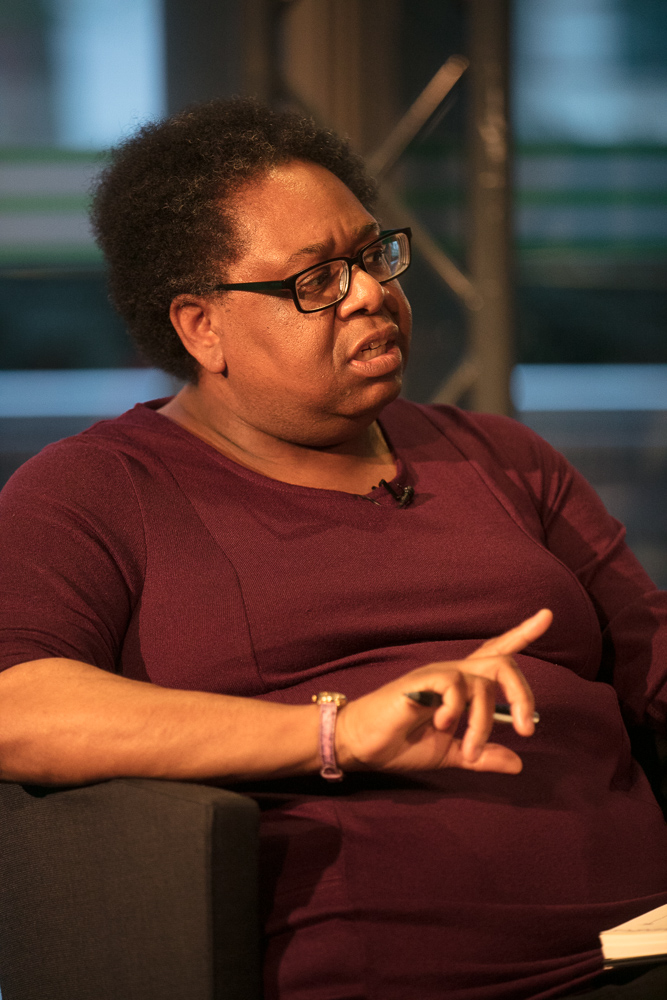
Murray sounded pessimistic about the opportunities for disabled actors in TV drama and comedy. In other non-scripted areas, she said that British TV was doing more to embrace disabled representation.
But she was concerned about some of the freak shows featuring disabled people that populate schedules. Sensationally titled factual entertainment shows seemed popular with able-bodied people “who sit in amazement and go, ‘Wow, look at that person with two heads,’” argued Murray. “It is a cheap way in and a way of a ticking a box.… The contributors are not being paid. They are only getting travel expenses.
“These shows are a cheap way for networks to say, ‘We got viewers and we have done our bit.’”
All the panellists agreed that real and lasting change would come only when some of TV’s decision-makers were hired from the ranks of the disabled.
Adepitan thought it would take another five years before this happened. By then, people like Jones, working in mid-ranking jobs, would be promoted to executive roles.
Ultimately, broadcasters and film studios were losing out financially by continuing to marginalise the disabled, argued Hills. Once they woke up to the impact that improved depictions of the disabled could have on the company’s bottom line, a tipping point would be reached.
“TV and the media forget that there’s a disabled audience that is willing to spend money. They want to watch these shows,” agreed Adepitan. “If you advertise and you market towards them, you’re going to get their money. I just don’t understand why they neglect that audience.”
Williams said that it was financial considerations that made Sky sit up and take notice of its black subscribers: “They went, ‘Look, 21% of our audience is not white, and they pay for telly. We are not feeding them. Let’s go out and buy some content and feed them.’ It drove up the numbers.”
Asked about the various schemes and initiatives apparently championed by broadcasters over the years, Murray was scathing: “I think they are as useful as a condom in a convent.”
She added: “I have been doing this for 20 years, I have seen you at many panels, I have been in the audience, on the stage, and I can’t believe we are still doing it.
“It is the same questions and it goes back to the same answer: fear. It is like: just do it, just book disabled people, just use us, whether it is behind the screen or on the screen.
“We are all mature enough and have our shit together enough to do a job. We wouldn’t ask to work in an industry that we couldn’t cope in.”
Quotas: for and against
The case for
Adam Hills: ‘If we didn’t have a quota, how many disabled people would have worked behind the scenes at the Games in Rio?
‘Quotas are a pain in the arse but, if your disability is going to hold you back when you go into an interview, we may need them.’
The case against
Deborah Williams: ‘I am against quotas because implementing them is difficult. Each of the five broadcasters in the UK has a different approach.… Some people do have quotas. For them, it works.
‘But most quotas are set at entry level. What do you do when you get to senior management? What do you do when you get to executive producers? What do you do in production companies?
‘I prefer the long-term goal of changing the way that the industry works, including a change in working practices.’
The experience
Rosie Jones: ‘I’m very pro schemes. I started in TV in 2011 because of a scheme and that meant that I could leapfrog over being a runner, which was great because I’m crap at running. But you do not want me to make you a cup of tea.’
On its own, one leg isn’t funny
Adam Hills, presenter of Channel 4’s The Last Leg, recalled how, working as a newbie stand-up comedian in his native Australia, he was told by a veteran performer to hide his disability.
‘I had just started doing paid gigs and I remember doing a joke about my foot,’ he said. ‘One of the older comics took me aside and said, “You’re not good enough to talk about your foot yet. If you talk about your foot now, you are going to be the guy with one leg, that’s all people are going to want you to talk about.”’
Hills then spent 13 years on the comedy circuit avoiding jokes relating to his foot. It was not until 2001 that he felt his comedy chops were good enough to mine material from the disability.
Two things happened: Hills was nominated for the Perrier Awards in Edinburgh and an incident at airport security, in the wake of 9/11, persuaded him that having a prosthetic lower leg was good for his act.
Hills said: ‘I was going through Heathrow three days after 11 September and people were freaked out about my foot, because it would set off metal detectors.
‘A security guard came over and I explained it was a prosthetic leg. He shat himself and said: “It’s all right, mate, go straight through.”
‘It was the look on his face: “I don’t care if a plane comes down, I don’t want to offend a spastic.”
‘That punchline is the reason that I started talking about my prosthetic on stage.
‘The only hurdle I found was that there were some audience members who’d been following me for years and they were angry that I had never talked about it before…
‘In a way, for me, it’s become my little secret weapon I can whip out when I need to.’
‘Where have all the disabled people gone?’ was an RTS early-evening event held at Channel 4 in central London on 10 April. The producers were Dan Brooke and Jonathan Simon.

